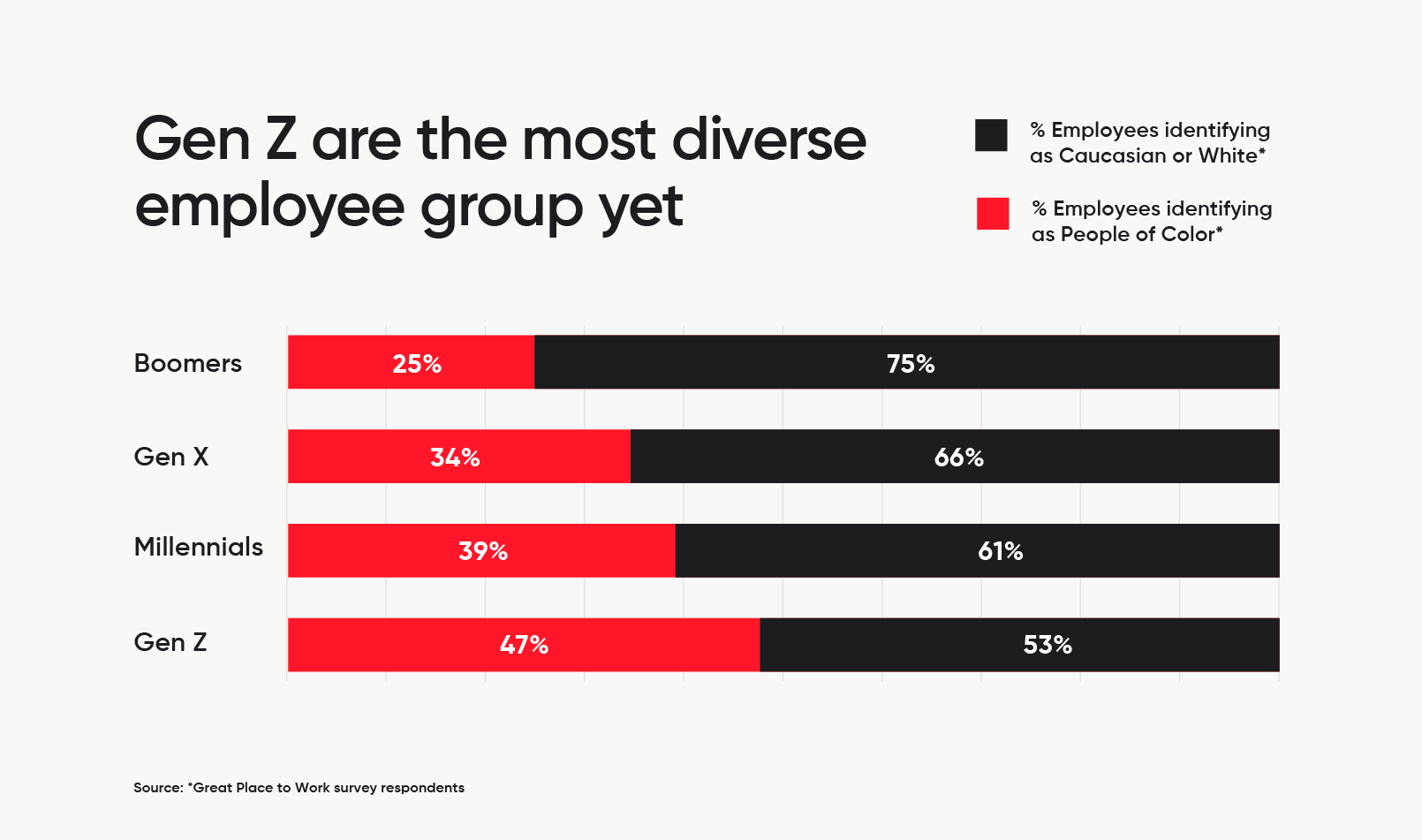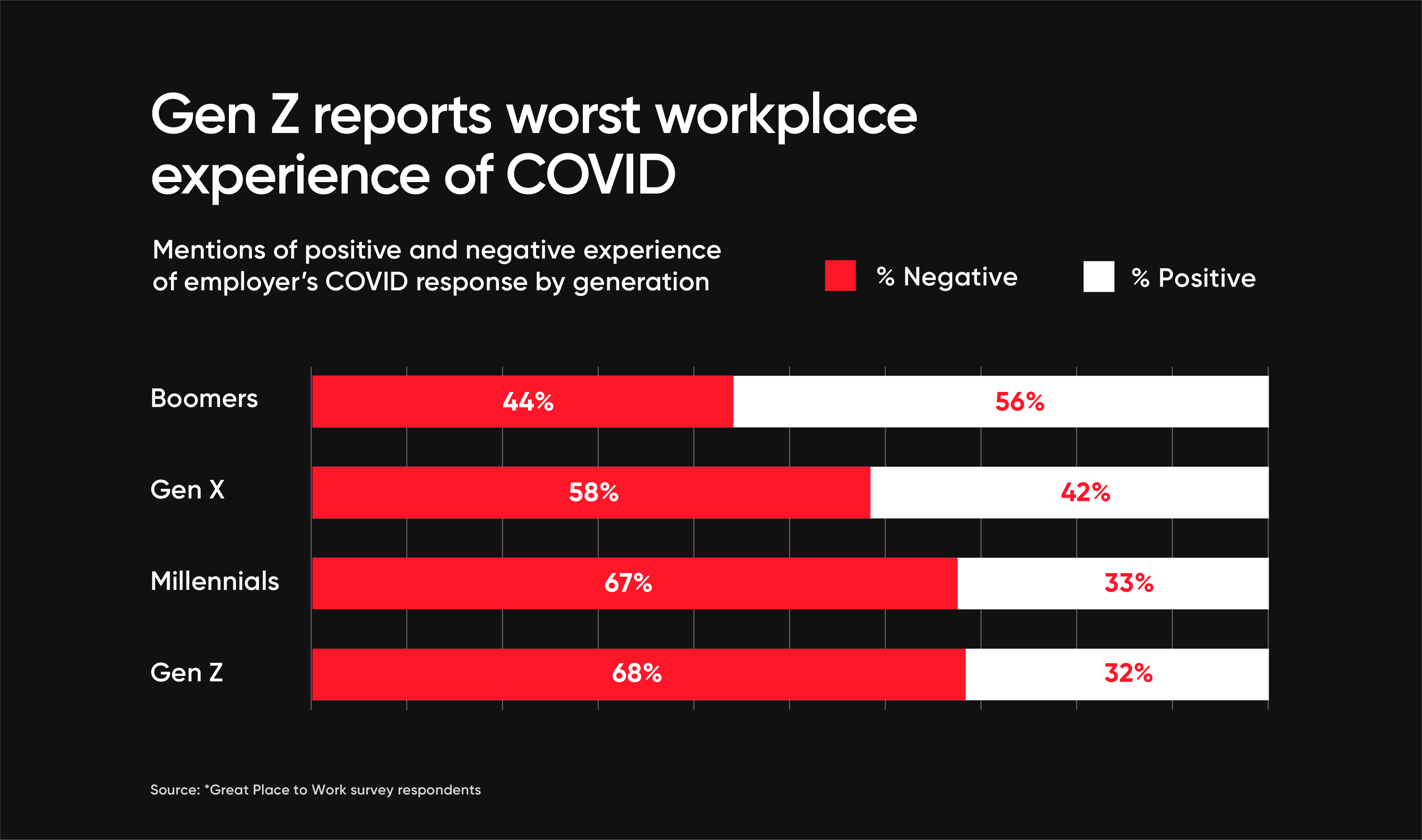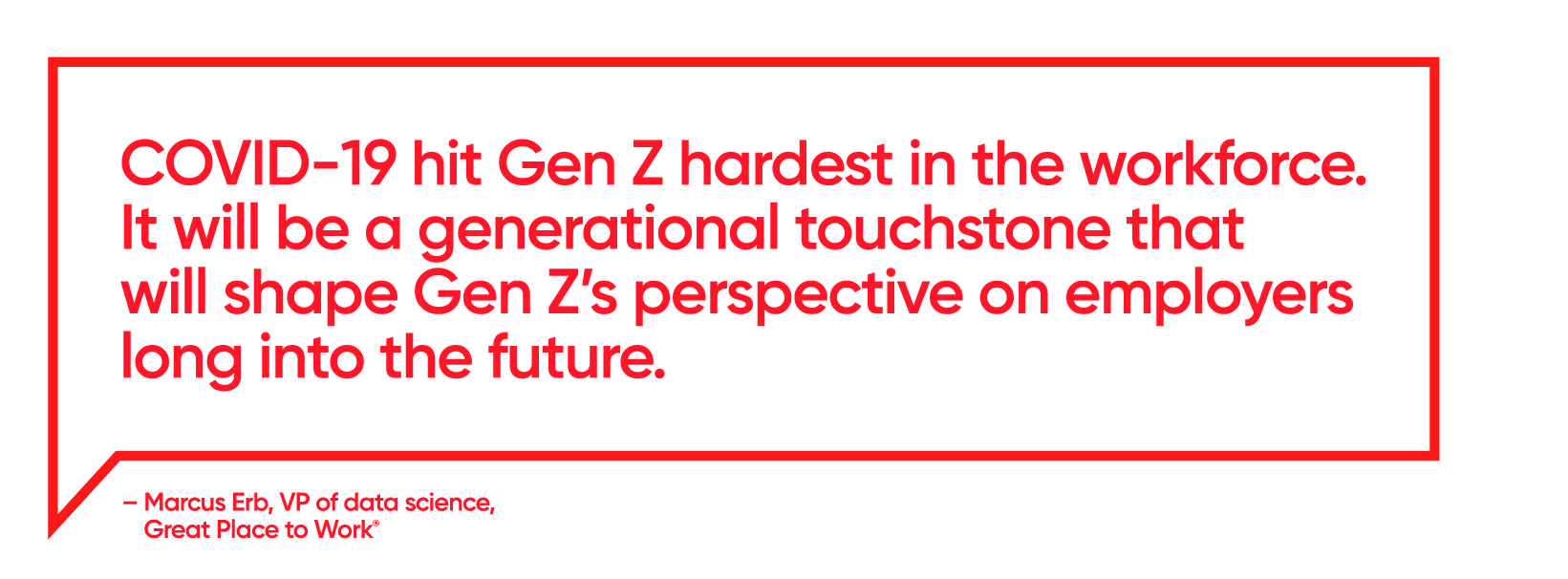
Benchmarks & Trends, Employee Experience, Gen Z, Hiring, Recruiting
How prepared are you to meet Gen Z in the workplace?
For years, businesses have been focused on attracting the millennial market – both as customers and as employees. But now, Gen Z – those born between 1997 and 2012 – are coming of age and entering the workforce.
According to the U.S. Census Bureau, Gen Z makes up 20.3% of the U.S. population. And worldwide, Gen Z has surpassed millennials as the largest generation, making up 32% of the global population, reports Bloomberg.
With the oldest Gen Zs 26 years old in 2023, they’re still a relatively small portion of the U.S. workforce (only 11.6% in 2020, according to the Bureau of Labor Statistics). But as they age up, they’ll become as much of a force as — some may argue even more so than — the millennial generation.
Through our research on company culture at the Best Workplaces™, we’ve collected over 32,000 Gen Z employee responses from over 350 companies across the U.S., giving us the data to understand what we know now about Gen Z in the workplace and to predict how to attract and retain them in future.
What we’ve learned is that Gen Z’s characteristics and experiences create unique talent management challenges. Here are three things that every hiring manager and people ops professional should know about Gen Z employees.
Gen Z is the most diverse generation
Generation Z is tracking to be the most diverse yet, with our data showing 47% of Gen Z employees identifying as BIPOC. By comparison, 39% of millennial workers we surveyed identified as PoC, versus 34% of Gen X and only 25% of boomers.
Despite this, Gen Zs are slightly less likely than millennials to be immigrants. However, they are more likely to be the children of immigrants. According to Pew Research Center, 22% of Gen Zs have at least one immigrant parent, compared to just 14% of millennials.

And with new immigrants expected to join America’s Gen Z in the coming years, the Census Bureau projects this generation will be majority non-white by 2026.
Gen Z are more conscious of systemic racism, hold non-traditional views of gender identity, and are hyper-aware of issues of intersectionality.
For employers, this means you need to have a strong focus on diversity, equity, inclusion and belonging (DEIB), to attract and retain the growing pool of Gen Z talent.
More so than older generations, Gen Z are more conscious of systemic racism, hold non-traditional views of gender identity, and are hyper-aware of issues ofintersectionality.
Gen Z key: To attract and retain Gen Z employees, fostering a sense of belonging in the workplace should be a pillar of your company culture.
Gen Z is looking for something better
In our survey results, Gen Z returned lower marks for their employers than any other generation and were more likely to intend to leave:
- 32% more likely to leave than millennials
- 2 times more likely than Gen X
- 2.8 times more likely than boomers
Only 73% of Gen Zs said they look forward to going to their workplace, which was a full 10 points less than other generations.
They’re also more discerning than other generations when it comes to finding a sense of purpose in their work, with an 8-point drop from other generations for the statement, “My work has special meaning.”
Only 69% of Gen Z feel they are paid fairly, 7 points below other generations. And just 76% said they feel their company provides a psychologically and emotionally healthy place to work, compared to 83% for other generations.
Gen Z key: To retain Gen Z employees, pay them fairly and help them find purpose at work.
Gen Z is working in tough industries at a tough time
Because of their young age, Gen Zs are typically working in part-time, frontline roles, mostly in the retail, hospitality and aging services industries. While these are common entry-level careers for young workers, the impact of COVID-19 on these sectors has given Gen Z a unique crisis experience.
In retail and hospitality, they’ve faced furloughs due to lockdowns, followed by an increase in harassment and safety concerns as stores and restaurants have re-opened. In the aging services sector, which was already a demanding environment, they’ve faced unprecedented challenges in caring for the at-risk elderly.
Companies wanting to attract Gen Z talent will need to earn back the trust of a generation that feels employers didn’t step up in a time of crisis.
According to ADP, Gen Z was hardest hit by job losses last year. That age population lost 11% of their jobs, above the national average and impacts to other age groups.

And for younger Gen Zs, who are just finishing up their education, they’ve been confronted with cancelled classes and exams, delayed graduations, halted internships, and an overnight switch to online learning. All of this at a time when they should be excited to prepare for entering adulthood.
Employers would be smart to monitor how this plays out in the workforce. The trauma of joining the workforce at such a tumultuous time may be long-lasting and is likely to impact how Gen Zs view the workplace overall.

Already, our data shows exactly that. In our survey responses, while Gen X and millennials had mainly positive comments about how their companies handled the pandemic and supported employees, Gen Z had a much different experience.
Gen Z were significantly more likely to mention COVID-19 as evidence of how their company could have been better to employees:
- 78% more likely than millennials
- 160% more likely than Gen X
- 183% more likely than boomers
As a result, companies wanting to attract Gen Z talent will need to earn back the trust of a generation that feels employers didn’t step up in a time of crisis.
Gen Z key: Build (or repair!) trust by finding ways to engage Gen Z employees. (A good place to start? Survey them and follow up on their feedback.)
Want to hire the best Gen Z talent?
Make sure candidates know you offer a diverse, supportive and inclusive workplace by getting Great Place To Work-Certified™. Plus, surveying your employees with our Trust Index™ will help you ensure you are living up to Gen Z’s expectations of the workplace.










